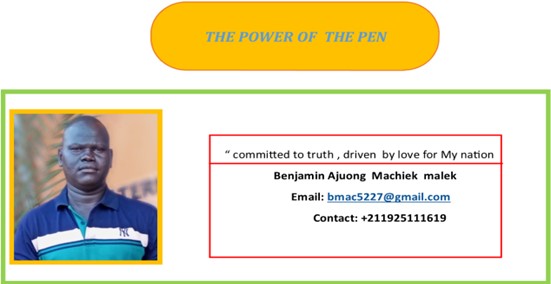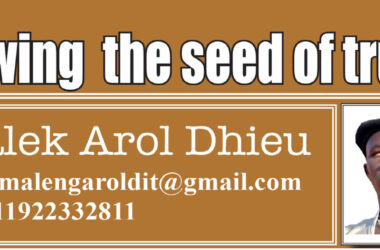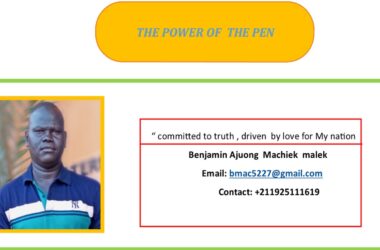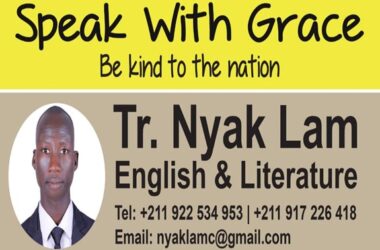In South Sudan, one thing that has always touched my heart is the deep love people have for their country. Despite the challenges — no regular salaries, limited resources, and the heavy weight of war memories — many South Sudanese still show their patriotism in powerful ways. They continue to build, to teach, to serve, and to care for others even when no one pays them. Recently, I came across a picture that moved me deeply — a man with a disability teaching children under a tree. His legs were weak, but his spirit was strong. His clothes were simple, but his heart was full of wisdom and courage.
When I saw that image, I didn’t just see a man with a disability; I saw a hero. I saw someone who loves his people and his country more than comfort or pride. This man may not walk like others, but he stands taller than many in spirit. He reminds us that disability is not in the brain. It is not in the heart. It is not in the mind. Disability is only in the body — and sometimes, the people who seem “disabled” in body are the most able in faith, wisdom, and love.
Sadly, many people in our society still judge those with disabilities unfairly. Some mock them, others ignore them, and many think they are useless. But the truth is, a person’s value is not measured by their physical strength, but by their heart, their mind, and their contribution to others. The man I saw teaching children, despite his condition, is doing more for the nation than many able-bodied people who sit idle and complain.
We must remember that every person, disabled or not, belongs to God. The Bible tells us that God created all of us in His image (Genesis 1:27). That means every person, whether walking or not, seeing or not, hearing or not, carries the reflection of God’s glory. To mock someone with a disability is to insult the Creator who made them. To reject them is to reject the gift God placed in them.
In South Sudan today, there are thousands of people with disabilities who are suffering silently. Some became disabled because of war injuries, others through sickness, accidents, or birth defects. Many of them have dreams — to teach, to farm, to start a business, or to serve their community — but they lack support. There are few schools that welcome disabled children, few jobs for disabled adults, and almost no government assistance. Yet, even with these hardships, many still rise above their pain and do great things.
The man teaching children is just one example. He may not have a classroom or a salary, but he has the heart of a teacher. He uses his knowledge to guide young minds, to give hope to children who have nothing. This is the kind of spirit our country needs — people who give not because they have much, but because they care.
We, as a society, must learn to support people like him. We must stop thinking that those with disabilities need only pity. No — they need opportunity. They need inclusion. They need respect. They need us to believe in them. Many disabled people can be teachers, leaders, engineers, pastors, or artists if only given a chance. As a community, we must create ways to empower them — by making education accessible, building ramps in schools, providing wheelchairs, offering small business grants, and above all, treating them with dignity.
Sometimes, those who cannot walk will show us how to move forward. Those who cannot see will teach us to open our spiritual eyes. Those who cannot speak may still express great love and faith through their actions. True disability is not in the body — it is in the heart that refuses to love, the mind that refuses to understand, and the society that refuses to care.
When I looked at that picture again, I realized something powerful: the real strength of a nation lies not in its soldiers or its money, but in its people’s compassion and unity. South Sudan has suffered enough from division and war. It is time to build a new culture — one where we uplift each other, regardless of physical appearance or condition.
To those who look down on people with disabilities, I say: be careful. The one you despise might be the one carrying the blessing you need. The one you call “useless” may be the one God uses to change your life. We must all remember: wisdom does not live in strong legs, but in a humble heart.
Let us celebrate those who keep teaching, serving, and loving even when life gives them little. Let us support them, speak for them, and include them in every plan for the nation’s growth. For in the eyes of God, we are all equal — and some of the greatest heroes walk not with their feet, but with their faith.
Disability is not in the brain; it is in how we see others. Stop judging. Start loving. And you will see God’s wisdom shining even in those you once ignored.
Thank for reading .




